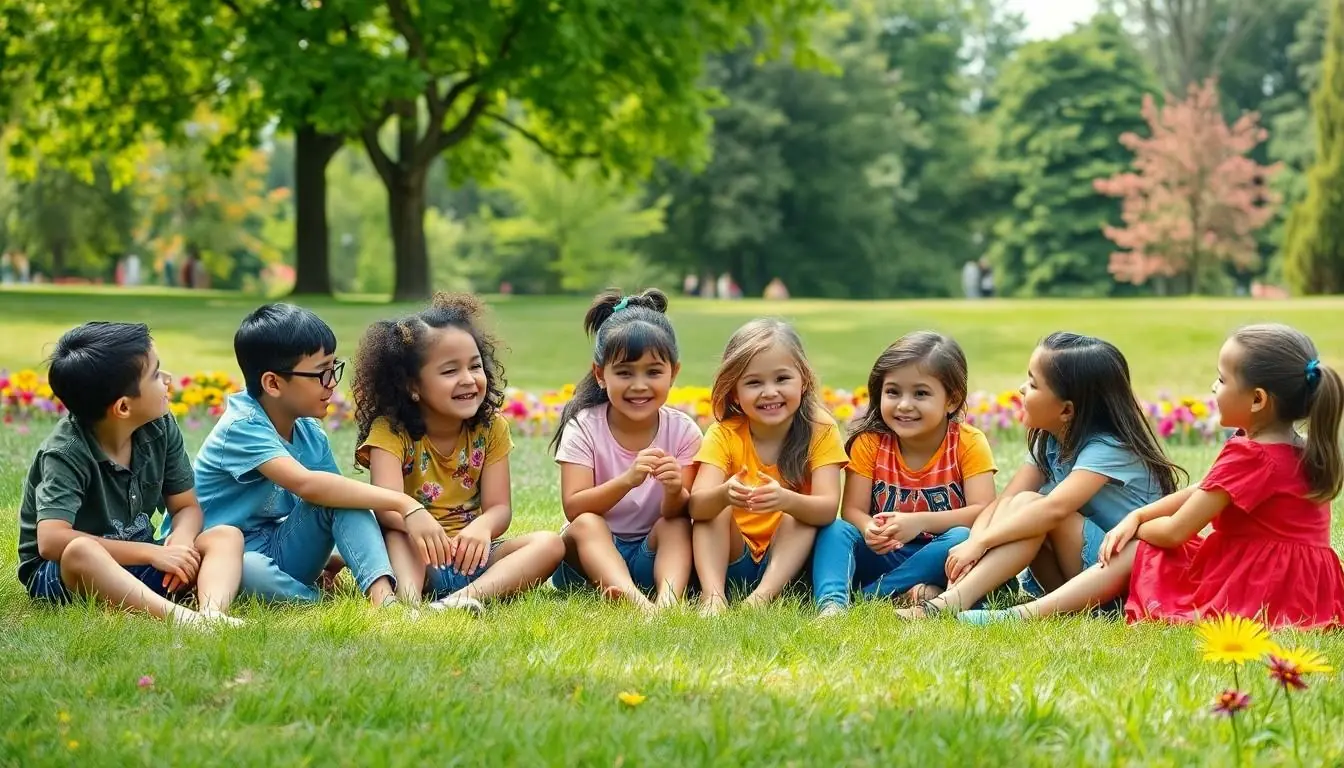Kids face a whirlwind of emotions every day, from the highs of playground victories to the lows of missing out on dessert. Navigating these feelings can be tricky, and that’s where the power of words comes in. Mental health quotes for kids aren’t just clever sayings; they’re little nuggets of wisdom that can spark joy, inspire resilience, and help young minds understand their emotions.
Table of Contents
ToggleUnderstanding Mental Health for Kids
Mental health shapes how children think, feel, and act. Recognizing this aspect promotes emotional growth and well-being.
Importance of Mental Health Awareness
Awareness of mental health significantly impacts children’s lives. It equips them with the skills to identify and manage their emotions. Regular discussions about feelings help children feel valued and understood. Statistics reveal that 1 in 5 children experiences a mental health issue, pointing to the need for early intervention. Parents and caregivers play a crucial role in fostering an open dialogue. Creating safe environments encourages children to express themselves without fear.
How Quotes Can Help
Quotes provide children with relatable wisdom and guidance. Sharing inspirational quotes can simplify complex ideas about emotions. For instance, a quote may remind them that it’s okay to feel sad sometimes. Simple phrases encourage resilience and help kids navigate challenges. They instill hope and motivate positive thinking. By repeating impactful quotes, children reinforce their understanding and acceptance of their feelings. Engaging with these quotes strengthens emotional intelligence, allowing kids to share their experiences with peers effectively.
Top Mental Health Quotes for Kids

Mental health quotes can inspire children and help them understand their emotions. Below are categories of quotes that resonate deeply with kids.
Inspirational Quotes
“Believe in yourself” acts as a powerful motto. This simple phrase encourages kids to embrace their potential. “You are braver than you believe” reminds them that courage comes in many forms. Another quote states, “Your feelings are valid.” Such statements validate their experiences, fostering resilience. Quotes like these can motivate children to face challenges with positivity, reinforcing the belief that they have the strength to overcome obstacles.
Encouraging Self-Acceptance
“You’re unique, just like everyone else” emphasizes the importance of individuality. Recognizing this allows kids to appreciate their differences. “It’s okay to not be okay” supports emotional honesty. This quote reinforces that it’s normal to experience ups and downs in life. Lastly, “Love yourself first” promotes self-compassion. These affirmations nurture a healthy self-image, helping children navigate their feelings and develop a strong sense of identity.
Using Quotes in Daily Life
Using mental health quotes in everyday situations can foster emotional awareness among children. Quotes serve as effective conversation starters and can seamlessly integrate into discussions about feelings.
Integrating Quotes into Conversations
Encouraging kids to share their thoughts can enrich dialogues about emotions. When a child expresses sadness, stating “It’s okay to not be okay” reinforces that emotional honesty is crucial. Parents can weave quotes into daily conversations, helping children relate their feelings to memorable phrases. Talking about overcoming obstacles might involve a simple reminder of “You are braver than you believe,” empowering them during difficult times. By making these connections, children learn how to articulate their emotions better, fostering a nurturing environment for their mental health.
Creative Ways to Display Quotes
Displaying quotes can spark interest and motivate children. Crafting a quote wall at home allows kids to see encouraging phrases daily. Using colorful sticky notes, they can write down their favorite quotes and post them in shared spaces. Art projects can include personalized illustrations paired with uplifting sayings, making the experience enjoyable. Creating digital slideshows with quotes can provide an engaging way to revisit their thoughts during specific moments. By showcasing quotes in these ways, children absorb positive messages naturally throughout their day.
The Role of Parents and Educators
Parents and educators play crucial roles in supporting children’s mental health. They can utilize mental health quotes as effective tools to enhance emotional understanding and resilience in kids.
Supporting Children Through Quotes
Supporting children through quotes encourages them to process complex feelings. Inspirational messages like “Believe in yourself” can instill confidence, while affirmations like “It’s okay to not be okay” promote emotional honesty. Quotes validated by research empower children to normalize their feelings, nurturing a stronger self-identity. Additionally, embedding these quotes in daily routines reinforces positive affirmations, making the concepts more relatable to young minds.
Encouraging Open Discussions
Encouraging open discussions helps children express their feelings more freely. Parents and educators can initiate conversations using quotes, prompting kids to share their experiences. For instance, asking “What does ‘Your feelings are valid’ mean to you?” invites personal reflection. Open dialogue normalizes emotional expression, breaking down barriers to understanding feelings. Regular interactions built on these quotes foster trust, creating a safe environment for children to navigate their mental health challenges.
Mental health quotes for kids play an essential role in shaping their emotional landscape. These powerful words can inspire resilience and foster a deeper understanding of their feelings. By integrating these quotes into daily life, children learn to articulate their emotions and embrace their unique experiences.
Parents and educators have a vital part to play in this journey. Encouraging discussions around mental health quotes creates a safe space for children to express themselves. This not only strengthens their emotional intelligence but also builds trust and openness. As they navigate life’s challenges, these quotes can serve as guiding lights, reminding them that it’s okay to feel and that they are never alone in their struggles.



